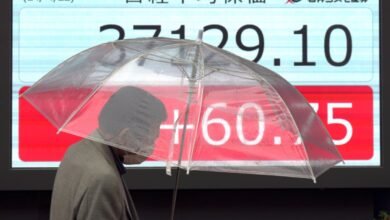Japan’s stock sell-off will continue as yen strengthens: UBS


Going into the Japanese market at this moment is akin to catching “a falling knife,” Kelvin Tay, regional chief investment officer at UBS Global Wealth Management, told CNBC’s “Squawk Box Asia.”
His comments come as the Nikkei 225 and the Topix extended their declines, falling past 7% on the day, and hovering close to bear market territory.

“The only reason why the Japanese market is up so strongly in the last two years is because the Japanese yen has been very, very weak. Once it reverses, you got to get out right and I think they’re all getting out right now as a result of that,” Tay said.
The yen, which weakened to a 38-year low of 161.99 against the U.S. dollar in June, reversed course during the run-up to the Bank of Japan’s policy meeting.
It strengthened sharply after the BOJ raised its benchmark interest rate last week to around 0.25% and decided to trim its purchases of Japanese government bonds.
Currently, the yen was last trading at 144.82, its lowest level against the greenback since January. A stronger yen pressurizes Japanese stock markets, which are heavily dominated by trading houses and export-oriented firms by eroding their competitiveness.

BOJ governor Kazuo Ueda had struck a hawkish tone during his press conference after the bank’s July 31 meeting, saying that “if the economy and prices move in line with our projection, we will continue to raise interest rates,” according to Reuters.
He also said there was “still quite some distance” before its policy rate reaches a neutral level that neither cools nor overheats the economy.
Ueda also said the 0.5% interest rate level — Japan has not seen that since 2008 — was not a barrier, and rates could go even higher.
The yen barometer
Tay said the yen can indicate whether the Japanese market will do well. As the yen has strengthened, stocks have declined, “there is still a lot more pressure on the Japanese stock market, unfortunately,” he said.
While Tay acknowledged that some gains made by the market were due to corporate restructuring efforts by the Tokyo Stock Exchange, “the main driver was the Japanese yen.”
One factor why the yen has featured so heavily in Japanese market is what is known as the unwinding of the “yen carry trade.”
When the yen was weak and interest rates from the BOJ were at zero or negative, investors would borrow in yen, and invest the proceeds in higher yielding assets.
Taking the central bank benchmark interest rates as a guide, an investor could have borrowed yen at a 0% interest rate earlier in the year, and invested the money in the U.S., earning an interest of 5.25%.
Now, with the U.S. Federal Reserve signaling rate cuts are on the table and the Bank of Japan raising rates, the interest differential between the two central banks will narrow, making a “carry trade” less attractive, potentially setting the stage for the yen to strengthen further.
Tay expects the yen to reach about 143 to the dollar, but if Japanese life insurance companies and pension funds start repatriating more yen back to Japan, the currency could go to 135 against the greenback.
“So, yes, it [the yen] might find a level, but at this point in time, the Japanese stock market is still not attractive enough for me to actually want to go into.”
Source link





